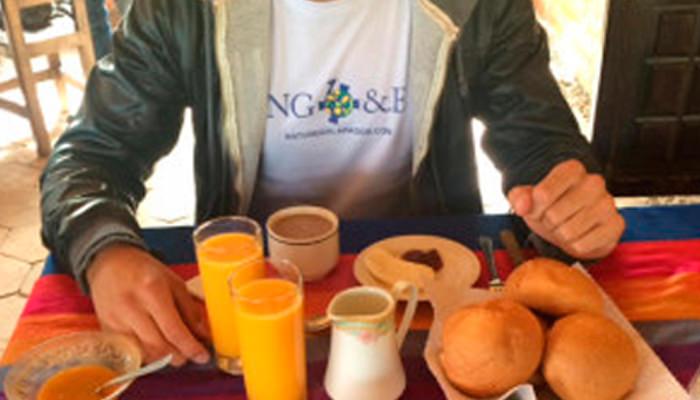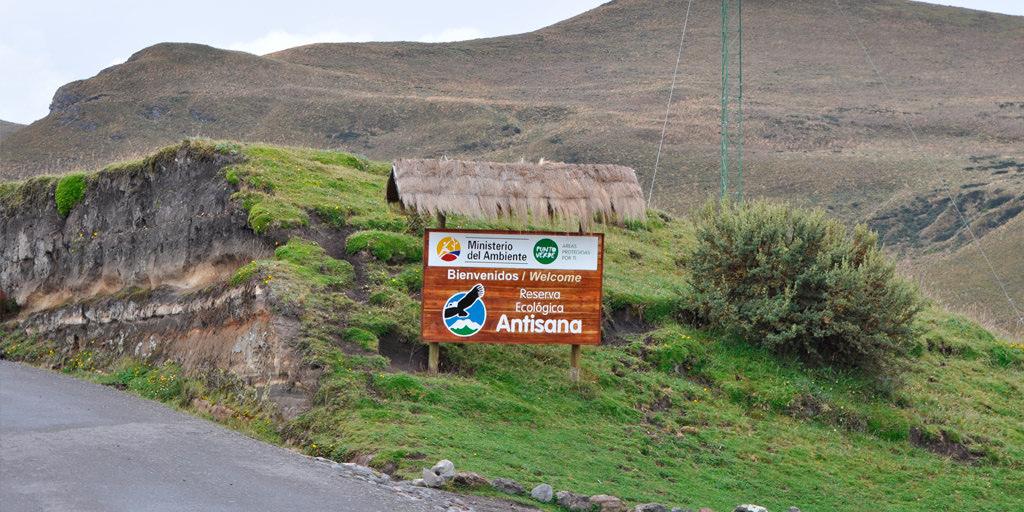A biking advetnure across the Andean Paramo in Antisana Geological Reserve
Our adventure Antisana bike tour towards Antisana Ecological Reserve began early on a Sunday morning. My travel companion is Carlos a fellow travel agent, neither of us has a specialized knowledge in biking other that urban biking. The meeting point was set in north-central part of the Quito city, where a van with bikes on the roof is waiting for us. The Antisana Reserve is located 50km south-east from Quito, between Pichincha and Napo provinces, the threshold between the Andean Sierra and the Amazon. The ride takes about 1 hour riding the Interoceanica Highway towards Pifo then then through Av. Ruminahui which leads to the Colibrí Roundabout towards the lovely town of Píntag .
Our first stop is right between Pintag and the entrance to the Ecological Reserve at a lovely sport called Tambo Condor, restaurant and viewpoint. Here we have breakfast right next to Secas Lagoon, one of the many in the area product of the natural damming of former eruptions of Antisana Volcano. The area offers an outstanding view, it is cradled by a rocky mountain and a crag settled by the millenary Andean Condor.

Breakfast
Breakfast served by its very kind owner Vladimi Ushina. Fresh coffee, scrambled eggs, bread, cheese and jam should be enough for the adventure still to come. The restaurant also works as a natural birdwatching spot, hummingbirds are the easiest to spot.
We continue heading deep into the Reserve towards La Mica Lagoon. The ride takes approximately 30 minutes form the Tambo Condor. As you drive deep into the Reserve, the Páramo landscape slowly takes hold and transforms as we get deeper towards the lagoon. Polylepis tress (aka. paper tree) proliferate here, thay are endemic to the Andean areas and a vital specie holding the Parma Ecosystem together. The view then turns into a desert-like landscape. Our guide Omar explains that even though the Paramo looks so dry, it actually holds enormous quantities of water, it functions like a sponge saving water in its floor. We were soon able to actually experience this on our hike in La Mica.
The yellowish moorland grass reflected by the sun makes it even more delightful for the eye. It is kind of cloudy but we are still able to see Antisana partially, with all it’s white-snowed beauty.
La Mica Lagoon entrance
Once we arrive to La Mica Lagoon entrance, a forest keeper greets us and briefly explains the rules of the park. Oscar then explain that we will head to 1 hr and 30 min hike around the lagoon to explore the Paramo ecosystem and try our walking legs in the altitude, la Mica is located at 4.000 meters above sea level (masl).
The hike goes smoothly most of the time, but given the altitude, it gets had to breathe at times, even for a pair or Ecuadorians. The hike is absolutely awesome; not much talking is needed from the guide except for some brief explanations on the flora and fauna. We are all deep in our thoughts admits the beauty of the area. The floors is wet and humid, however no hiking boots are necessary if you are careful enough.
Andean Paramo
The beauty of walking in the Andean Paramo is that you are actually able to feel the water within tis floors, soft, soggy and green as can be from all the water it retains. As you walk over certain areas you can feel your feet bouncing, almost like stepping in amat. The air is fresh and cold and the experience of breathing the cool Andean air is always energizing.
After a long the hike, the fun continues as we take a bike ride from La Mica all the way back to Tambo Restaurant (Pintag) to have lunch. The ride is about 20 kilometers. The first 7 kilometers are mainly plain and the last 2 kilometers before reaching the highest point of the pass was uphill. Our guide explains us there are two sports from where we can begin the bike ride. We choose the toughest one, which involves starting on a hill like terrain and reaching the highest point in the area. The road is the same used by cars, so the guide asks us to be careful.
Bike trip
The bike trip begins at first, as it is all down hills, but the way ascends in certain areas and it turns out a more challenging than what it looks like, which added more fun to our ride. There are no extremely steep roads, but given the altitude it is kind of challenging. It is a killer rider, though, complete solitude, the colors of the sierra as it surprisingly transforms as you descend and the cool breeze resonating in your ears. One must stop at several point of the road to admire the beauty of the place. It is mostly downwards and the highway has some potholes and closes curves, so some skill is need with the bike.
After 35 min we catch sight of Tambo Condor’s amazing view and our much desired lunch is being served. Traditional Locro (Potato Soup) for an entrance and a freshly caught trout with rice and salad, a typical delicacy form the area. Carlos asks for chicken instead, which is also tasty.
We also find a delightful surprise whilst waiting for our lunch, a guide has spot a Condors nest in the crag which is perfectly visible with the telescope. The guide explains us that we re lucky, even though Condors are common to the area, it is not always easy to spot them, a warm greeting after a hard bike ride in the high sierra.
After lunch we hop into the van and ride back to Quito around 3:00 pm. Tired but happy, we say goodbye to the Paramo and sleep tight on the road back.}
Some Tips to survive a Bike Ride in the Paramo Altitude
Soroche (altitude sickness) is a common thing for travelers in the Antisana. Control your breath. Take deep breaths and inhale by the nose, make sure you stay oxygenated
Rest well the night before, the bike ride can turn to be more challenging that what you expect
Bring warm but light clothes and a raincoat. Soft showers are constant in the area
Visit the location with a guide who knows the area. It is very to visitors to get lost in the Antisana Reserve
Bring waterproof hiking shoes. I did it with standard running shoes, but hiking boots will definitely improve your pace
- Physical Activity level: Medium
- Skills needed: Good physical state and basic biking knowledge
- Trip Type: Adventure
- The awesome Bike Ride:
About Antisana Volcano:
Antisana (5705 m) is the fourth highest and one of the most beautiful snowcapped volcanoes in Ecuador. It is surrounded by a vas extensions of Paramo forest which folds endemic plants and endangered animals. Such as the Condor which is the national emblem of Ecuador.
Text and Photos: Sara A. Yagual
Photos: Carlos Velasquez
Video Edited by: Juan Abril



Comments